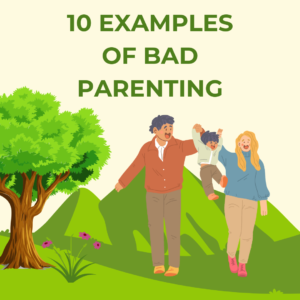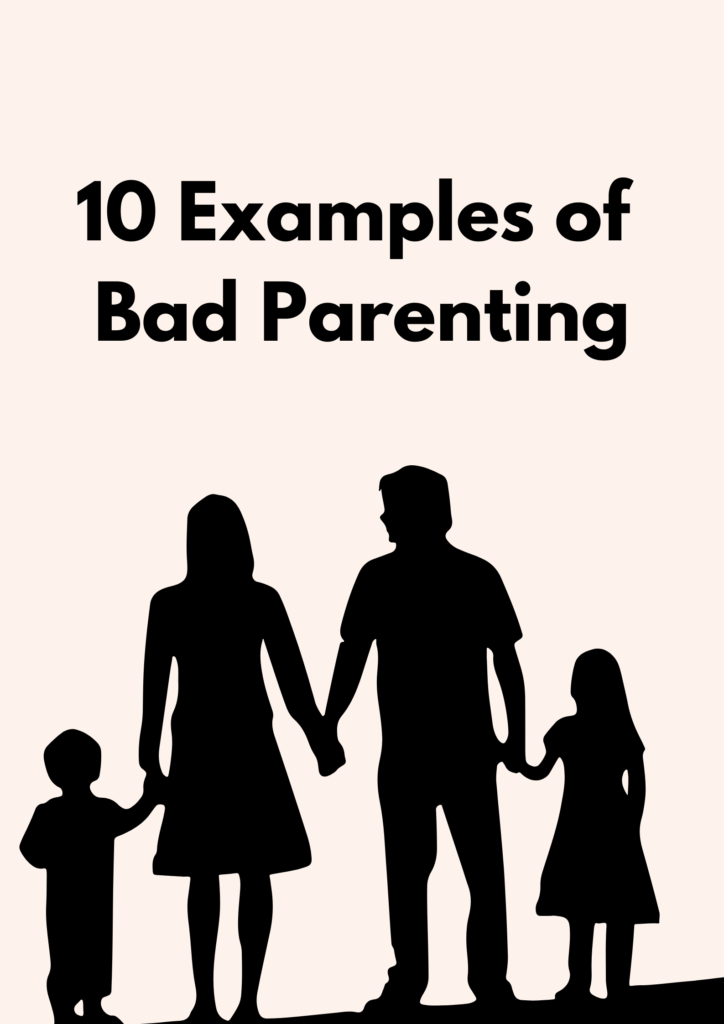Parenting is always awesome and amazing, but it’s also hard and challenging from time to time However, even the best-intentioned parents can sometimes fall into patterns that may not serve their children well. Understanding what constitutes bad parenting is crucial for fostering a nurturing environment for children. Here are 10 examples of bad parenting, along with insights on how to avoid these pitfalls.

Lack of Communication
Effective communication is essential for building trust and understanding between parents and children. A lack of open dialogue can lead to feelings of neglect and misunderstandings. Bad parenting often involves ignoring a child’s opinions or dismissing their feelings, which can hinder emotional development. When parents fail to listen or respond thoughtfully, children may struggle to express themselves and feel undervalued. Over time, this can result in emotional distance and unresolved conflicts within the family.
Overly Strict Discipline
While discipline is necessary, being overly strict can do more harm than good. Parents who use excessive punishment or enforce unrealistic rules may create fear instead of respect. This form of bad parenting can result in a child’s loss of self-confidence and independence. Strict discipline often suppresses creativity and critical thinking, as children may prioritize avoiding punishment over exploring new ideas. Additionally, it can damage the parent-child bond, making children feel unsupported and misunderstood.
Neglecting Emotional Needs
Neglecting a child’s emotional needs is a common example of bad parenting. Children require love, support, and encouragement to thrive. When parents fail to provide emotional care, children may struggle with self-esteem issues and emotional regulation later in life. Emotional neglect can take many forms, such as failing to celebrate achievements, dismissing fears, or withholding affection. These behaviors can leave lasting scars and hinder a child’s ability to form healthy relationships.
Overindulgence
On the other end of the spectrum, overindulgence is another form of bad parenting. Showering children with material possessions or shielding them from all hardships can prevent them from developing resilience and understanding the value of effort. Overindulgent parenting can create a sense of entitlement and make it difficult for children to handle disappointment. This approach often leaves children ill-equipped to navigate challenges independently, affecting their long-term success and emotional well-being.
Favoritism
Showing favoritism towards one child over another is a classic example of bad parenting. This behavior can lead to feelings of inadequacy and resentment among siblings, damaging their relationship and the family dynamic. Favoritism may also cause the favored child to develop an inflated sense of self-worth. while the overlooked child may struggle with low self-esteem. Over time, this imbalance can create a toxic family environment where trust and unity are compromised.
Inconsistent Parenting
Consistency is key to effective parenting. Bad parenting often involves inconsistency in enforcing rules and expectations. Children thrive on structure, and a lack of clear boundaries can lead to confusion and behavioral issues. For example, if a parent allows a behavior one day but punishes it the next, children may feel uncertain about what is expected of them. This inconsistency can undermine the parent’s authority and make it difficult for children to develop self-discipline.
Ignoring the Importance of Education
Failing to prioritize a child’s education is a significant example of bad parenting. Whether it’s neglecting homework, disregarding academic achievements, or not supporting their learning, such behavior can hinder a child’s future opportunities. Education is a cornerstone of personal and professional development, and parents play a crucial role in fostering a love for learning. Bad parenting in this area can result in a lack of motivation and poor academic performance, limiting a child’s potential.
Setting Unrealistic Expectations
Parents who set unattainable goals for their children can inadvertently cause stress and anxiety. Bad parenting often involves pressuring children to excel in areas where they may not have interest or talent, leading to feelings of failure and frustration. Unrealistic expectations can erode a child’s confidence and create a fear of making mistakes. Encourag. children to pursue their passions and celebrate their unique strengths is a healthier approach that promotes self-worth and happiness.
Overprotectiveness
While protecting children is natural, being overly protective can stifle their independence. Bad parenting in this context includes not allowing children to explore, make mistakes, or learn from their experiences, which are crucial for personal growth. Overprotective parents may inadvertently instill fear and anxiety in their children, making it difficult for them to navigate the world confidently. Encouraging age-appropriate independence helps children build resilience and problem-solving skills.
Disrespecting Personal Boundaries
Children, like adults, deserve respect for their personal boundaries. Bad parenting may involve invading their privacy, dismissing their opinions, or failing to treat them with dignity. This can damage the parent-child relationship and hinder the child’s development of healthy relationships. Respecting boundaries teaches children the importance of mutual respect and helps them feel valued. When parents model this behavior, they set a strong foundation for positive interactions in all areas of life.
By identifying these 10 examples of bad parenting, parents can reflect on their actions and strive for improvement. Bad parenting habits can be replaced with positive strategies that nurture a child’s emotional, intellectual, and social growth. Building a healthy parent-child relationship requires empathy, consistency, and a commitment to understanding each child’s unique needs. Being mindful of these behaviors ensures a supportive and loving environment where children can thrive, setting the stage for a brighter future for the entire family.
- Back-to-School Supplies Checklist for KidsWhen it comes to preparing for a new school year, nothing matters more than having the right back-to-school supplies. Whether your child is entering preschool, kindergarten, or first grade, a well-organized checklist ensures they’re ready to thrive. From crayons and glue sticks to personalized backpacks and lunch boxes, this guide covers all the essentials—and includes… Read more: Back-to-School Supplies Checklist for Kids
- Top Personalized Baby Gift Ideas for Every OccasionFinding the perfect gift for a newborn can be both exciting and overwhelming. That’s why we’ve curated the best personalized baby gift ideas that are not only thoughtful but also practical, creative, and unforgettable. Whether you’re searching for baby gifts ideas for a baby shower, a first birthday, or to celebrate a new arrival, personalized… Read more: Top Personalized Baby Gift Ideas for Every Occasion
- 10 Best Gifts for Dad Who Wants NothingIf you’ve ever asked a dad what he wants and heard, “I don’t need anything,”—you’re not alone. Dads can be some of the hardest people to shop for. But deep down, every father appreciates a thoughtful surprise, especially one that reflects your love and the memories you’ve created together. Whether you’re shopping for Father’s Day… Read more: 10 Best Gifts for Dad Who Wants Nothing
- Self Care for Moms: 5 Small Acts That Make a Big DifferenceMotherhood is one of the most beautiful journeys in life—but it’s also one of the most demanding. Between late-night feedings, diaper changes, and emotional rollercoasters, it’s easy for moms to put themselves last. That’s why self care for moms isn’t just a luxury—it’s a necessity. In this post, we’ll explore five small, manageable acts of… Read more: Self Care for Moms: 5 Small Acts That Make a Big Difference
- Best Gifts for New Moms – Zazzle FavoritesBringing a new life into the world is magical—and so is celebrating the new mom who made it happen. Whether you’re shopping for a friend, your sister, or even yourself, finding a gift that’s both meaningful and personal can be tough. That’s why I’ve rounded up 10 of the most thoughtful and best-selling personalized best… Read more: Best Gifts for New Moms – Zazzle Favorites
- Best Personalized Gift for Teenage GirlFinding the perfect gift for a teenage girl can be a challenging task. They have evolving tastes, unique preferences, and a strong desire for uniqueness. Personalized gifts are a great way to show that you put thought and effort into their present. Now we will explore the best personalized gift for teenage girl to make… Read more: Best Personalized Gift for Teenage Girl
- 20 Most Asking ‘Why my baby’ Tipe Questions That Ask Every New Parent About their baby.Welcoming a newborn into your family is an exciting yet overwhelming experience. As a new parent, you may have countless questions about your baby’s care and well-being. Now , we will address 20 of the most commonly asked questions . 1. Why Is My Baby Crying? Crying is how babies communicate. Your baby may cry… Read more: 20 Most Asking ‘Why my baby’ Tipe Questions That Ask Every New Parent About their baby.
- 10 Positive Parenting Tips For New Moms And DadsDiscover 10 positive parenting tips for new moms and dads to build strong connections with your child. From open communication to fostering independence, these practical parenting tips emphasize creating a safe, nurturing, and joyful environment for your little one. Learn how to model positive behavior, celebrate small wins, and prioritize quality time, all while taking… Read more: 10 Positive Parenting Tips For New Moms And Dads
- 10 Examples of Bad ParentingParenting is always awesome and amazing, but it’s also hard and challenging from time to time However, even the best-intentioned parents can sometimes fall into patterns that may not serve their children well. Understanding what constitutes bad parenting is crucial for fostering a nurturing environment for children. Here are 10 examples of bad parenting, along… Read more: 10 Examples of Bad Parenting
- Best 100 Unique Names for Your Child in 2025 Choosing the right name for your child is an exciting and important decision. Whether you’re after strong names for boys or beautiful names for girls, this list of 50 top names offers something special for everyone. From timeless classics to fresh, exceptional choices, you’ll find a name that suits your baby’s unique journey. Start your… Read more: Best 100 Unique Names for Your Child in 2025
- 11 Best Cleaning Tips for Busy Moms and DadsKeeping a clean house while managing kids can be challenging for busy moms, but when you know how to handle it, maintaining order becomes much easier. Between playtime, meals, and everyday activities, the mess can build up quickly. However, with a few helpful cleaning hacks, maintaining a tidy home doesn’t have to feel like a… Read more: 11 Best Cleaning Tips for Busy Moms and Dads
- Best 8 Tips On How To Be A Good MomBeing a good mom does not mean being perfect. It’s about loving and supporting your child while helping them grow into the best version of themselves. A good mom listens, cares, and guides her child with patience and understanding. Providing a safe and joyful environment, and giving your best effort every day. Here are some… Read more: Best 8 Tips On How To Be A Good Mom
- Do You Know 10 Simple And Effective Mental Health Care Tips for New MomsBeing a mom is not easy. Sleepless nights, feeding the baby, the toddler tantrums, the baby’s illness—there are so many responsibilities, and there is no time for yourself. As a result, a mom’s mental health can slowly decline. Mental health is so important for a mom or anyone, but in our society, many people don’t… Read more: Do You Know 10 Simple And Effective Mental Health Care Tips for New Moms
- 10 Creative And Fun Stay At Home Activities For Kids.Sometimes we must stay indoors for many reasons. It could be due to illness, a rainy day, or other factors. When we are stuck at home, we spend our time doing household work, but our kids get bored. They spend their time on screens for hours, but we all know that wouldn’t be the best… Read more: 10 Creative And Fun Stay At Home Activities For Kids.
- First day of school tips for parentsChildren typically start school around the age of 5 or 6, depending on the country and educational system. In many places, this is when they enter kindergarten or first grade. I will share some helpful First day of school tips for parents. At first, you have to make them prepared at least a week before… Read more: First day of school tips for parents
- How to calm down a toddler tantrum?How to calm down a toddler tantrum? The toddler stage is between ages 1 and 3. During this time they learn about how to communicate.Now we try to find out How to calm down a toddler tantrum At this time, they are learning to express their emotions. They start these tantrums to express their problems… Read more: How to calm down a toddler tantrum?

